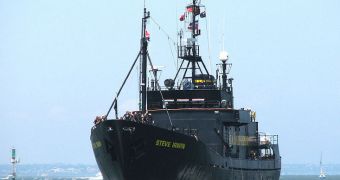Officials with the Sea Shepherd Conservation Society (SSCS) announce that the conservationist group has reached the half of its 2011 Operation No Compromise. Its main objective is to prevent the Japanese whaling fleet from conducting its illegal operations in the waters around Antarctica.
Sunday marked the 54th day of the operation, as well as the 25th day since the Society's three boats managed to discover and start tracking the four vessels of the whaling fleet through the waters of the Southern Ocean Whale Sanctuary.
In about a month and a half, the SSCS says, the harsh conditions brought on by the incoming Southern Hemisphere winter will start driving the whalers back home, as they will no longer be able to conduct their operations safely.
All that the conservation group has to do is maintain the same pressure on the three whalers and the single factory ship the Japanese sent this year. In other years, escort vessels were developed alongside the fleet, but this year no such ships set sail for Antarctica.
“On the very positive side during this campaign, we were able to locate the Japanese whaling fleet before they killed a single whale,” says SSCS Captain Paul Watson in a statement.
“We were able to intercept the Sun Laurel refueling vessel to cut off supplies and fuel to the Nisshin Maru and the rest of her whaling fleet,” he goes on to say.
“Most importantly of all, we have kept two of the three harpoon vessels out of whaling operations completely, while the third continues to run along with the Nisshin Maru,” he adds.
Over the last 24 days or so, the Steve Irwin, the Bob Barker and the Gojira, featuring a combined crew of 88 members and a small helicopter, covered more than 4,000 miles while giving chase to the whalers and their factory ship.
This intense pressure is making it impossible for the Japanese to effectively hunt whales. This means that some of the majestic creatures may indeed be killed, but not as many as in other years, when the illegal cull was left unchecked.
“The evidence of our success this year will be seen when the Japanese whaling fleet announces their final kill statistics sometime in April. Those figures should be lower than prior years,” Watson says,
“Without two of their three harpoon vessels to aid in the killing and with the third being constantly on the run, their efficiency and productivity as an industrial endeavor has been greatly diminished. The 2010/2011 whaling season will be a financial disaster for the Japanese fleet,” he concludes.

 14 DAY TRIAL //
14 DAY TRIAL //